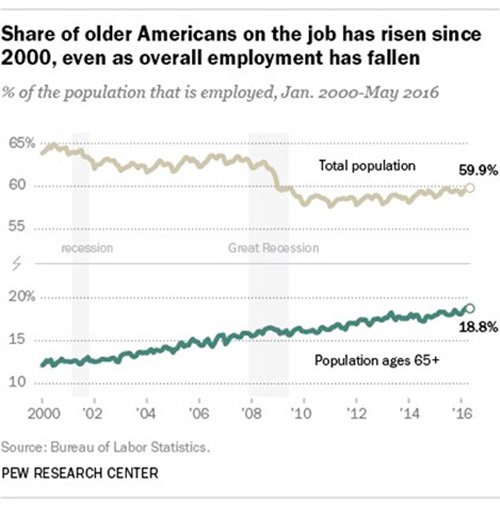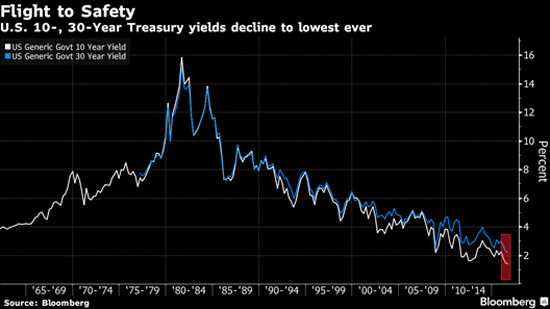| -- | July 5, 2016
Turning Lemons into Lemonade as 30-Year T-Bond Yield Falls to All-Time Low “I certainly see low bond yields, and I see an environment [where] that’s likely to continue into the future.”
—James Bullard, President, St. Louis Federal Reserve Back in 2000, only 4.2 million (about 12%) of Americans aged 65 and up were working. Today, about 9 million (18.8%) of older Americans are working—that’s more than at any time since the turn of the century.  Interestingly (or sadly, depending on your view), the trend for the rest of the American population is almost the mirror image. The employment/population ratio of the adult population has not rebounded from the last two recessions. As of May, the employment/population ratio was 59.9%; that’s below the 62.5% we saw in May 2008 and the 64.5% of May 2000. Why are so many older Americans working? You could point your finger at several reasons—inadequate savings, the weak economy, and longer life expectancies—but I think one of the biggest reasons is the Federal Reserve’s war on savers. I’m talking about ZIRP (zero interest rate policy), which has pushed the return on traditional savings vehicles—like bonds and CDs—to almost nothing. However, even today’s paltry rates may soon disappear as ZIRP is threatening to morph into NIRP (negative interest rate policy). According to Janet Yellen, “We’re taking a look at them. I wouldn’t take those off the table.” Yellen isn’t the only Federal Reserve official talking about negative interest rates. Negative interest rates are “working more than I can say I expected.”
—Stanley Fisher, Vice-Chairman, Federal Reserve “If the economy were to unexpectedly weaken dramatically, and we decided that we needed to use a full array of monetary policy tools to provide stimulus, it’s something that we would contemplate as a potential action.”
—William Dudley, President, Federal Reserve Bank of New York “I think negative rates are something the Fed will and probably should consider if the situation arises.”
—Ben Bernanke, former Fed Chairman “Europe has demonstrated that negative rates are possible.”
—Alan Blinder, former Fed Vice-Chairman Yikes! US interest rates aren’t in negative territory yet… but we’re getting closer as the yield on the 30-year Treasury bond hits a record-low 2.18%. Let that fact sink in: in the 240-year history of the United States of America, yields are at an all-time low. So older Americans have no choice but to work to make ends meet.  When I first entered the investment business in the 1980s, yields on both 10-year and 30-year US Treasury bonds were above 15%. Yup, you could have locked in a GUARANTEED 15% return for the next 30 years if you would have loaded up on long-term Treasuries back then. At the time, money market yields were near 20%, so despite my enthusiastic recommendation at the time, most investors refused to buy those juicy long-term bonds. “Why should I tie my money up for 30 years at 15% when money market rates are paying 20%?” my clients would ask. That objection seems silly today, but that is how many investors (maybe even you) felt in the 1980s. Income-focused investors face a different but similar challenge today. If you’ve read this column for any length of time, you know I’ve been recommending dividend-paying stocks over traditional fixed-income investments. You see, the rules for successful income investing have changed, and you need to adjust your portfolio to profit from ZIRP and NIRP by adopting my Yield Shark income strategy that focuses on dividends instead of interest payments. Until midnight of today, July 5, the special offer from last week is still on. For just the rest of today, Connecting the Dots readers can get one year of Yield Shark for just $99… that’s half off the regular list price of $199. So don’t wait to sign up. Remember, you have 90 days to figure out if it’s right for you… and make some money in the meantime. Negative interest rates sounds, well… negative, but NIRP will be a boon to a dividend-based strategy as yield-starved investors from all over the world pile into dividend-paying stocks. 
Tony Sagami
 30-year market expert Tony Sagami leads the Yield Shark and Rational Bear advisories at Mauldin Economics. To learn more about Yield Shark and how it helps you maximize dividend income, click here. To learn more about Rational Bear and how you can use it to benefit from falling stocks and sectors, click here. Share this newsletter
    http://www.mauldineconomics.com/members
Use of this content, the Mauldin Economics website, and related sites and applications is provided under the Mauldin Economics Terms & Conditions of Use. Unauthorized Disclosure Prohibited The information provided in this publication is private, privileged, and confidential information, licensed for your sole individual use as a subscriber. Mauldin Economics reserves all rights to the content of this publication and related materials. Forwarding, copying, disseminating, or distributing this report in whole or in part, including substantial quotation of any portion the publication or any release of specific investment recommendations, is strictly prohibited. Participation in such activity is grounds for immediate termination of all subscriptions of registered subscribers deemed to be involved at Mauldin Economics’ sole discretion, may violate the copyright laws of the United States, and may subject the violator to legal prosecution. Mauldin Economics reserves the right to monitor the use of this publication without disclosure by any electronic means it deems necessary and may change those means without notice at any time. If you have received this publication and are not the intended subscriber, please contact service@mauldineconomics.com. Disclaimers The Mauldin Economics web site, Yield Shark, Thoughts from the Frontline, Tony Sagami's Rational Bear, Stray Reflections, Outside the Box, Over My Shoulder, World Money Analyst, Street Freak, Just One Trade, Macro Growth & Income Alert, Transformational Technology Alert, and Conversations are published by Mauldin Economics, LLC. Information contained in such publications is obtained from sources believed to be reliable, but its accuracy cannot be guaranteed. The information contained in such publications is not intended to constitute individual investment advice and is not designed to meet your personal financial situation. The opinions expressed in such publications are those of the publisher and are subject to change without notice. The information in such publications may become outdated and there is no obligation to update any such information. John Mauldin, Mauldin Economics, LLC and other entities in which he has an interest, employees, officers, family, and associates may from time to time have positions in the securities or commodities covered in these publications or web site. Corporate policies are in effect that attempt to avoid potential conflicts of interest and resolve conflicts of interest that do arise in a timely fashion. Mauldin Economics, LLC reserves the right to cancel any subscription at any time, and if it does so it will promptly refund to the subscriber the amount of the subscription payment previously received relating to the remaining subscription period. Cancellation of a subscription may result from any unauthorized use or reproduction or rebroadcast of any Mauldin Economics publication or website, any infringement or misappropriation of Mauldin Economics, LLC’s proprietary rights, or any other reason determined in the sole discretion of Mauldin Economics, LLC. Affiliate Notice Mauldin Economics has affiliate agreements in place that may include fee sharing. If you have a website or newsletter and would like to be considered for inclusion in the Mauldin Economics affiliate program, please go to http://affiliates.pubrm.net/signup/me. Likewise, from time to time Mauldin Economics may engage in affiliate programs offered by other companies, though corporate policy firmly dictates that such agreements will have no influence on any product or service recommendations, nor alter the pricing that would otherwise be available in absence of such an agreement. As always, it is important that you do your own due diligence before transacting any business with any firm, for any product or service. © Copyright 2016 Mauldin Economics | -- |
